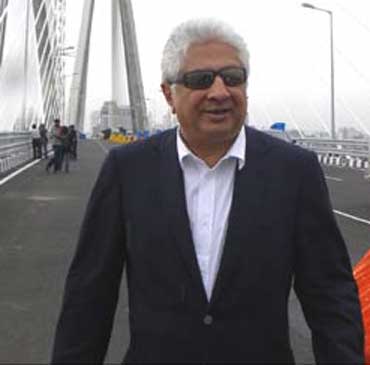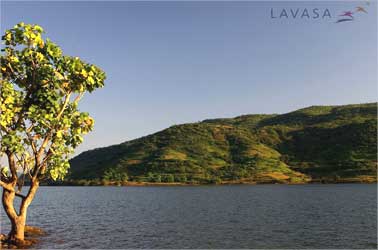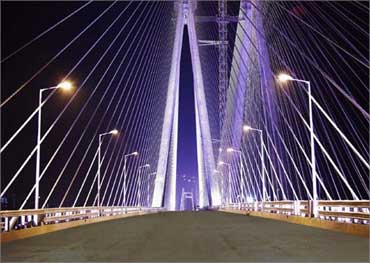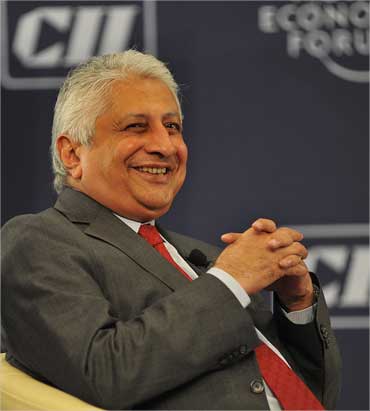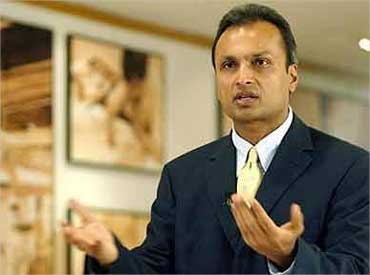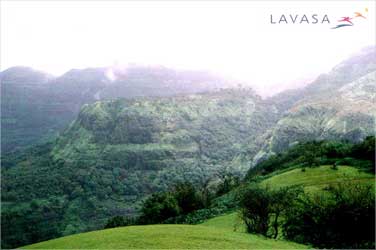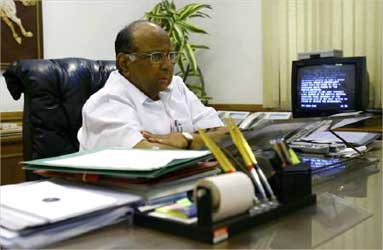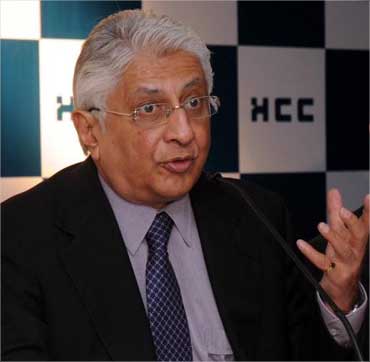 | « Back to article | Print this article |
Meet the man behind Lavasa and Mumbai sea link
The man behind the Bandra-Worli sea link and Lavasa is far from triumphant despite the brightening prospects for the controversial hill city
Ajit Gulabchand's drooping eyes acquire a tinge of pity as he looks at me and says: "Kuch to nasha karo yaar, bekhudi mein bhi maza hai" (do indulge in some intoxication, there is bliss in forgetting yourself)."
In the soft ambience of an empty Wasabi at the Taj Mahal hotel in New Delhi, the recourse to Hindustani, prompted by my refusal to have wine or coffee, is incongruous and somewhat filmy, but Gulabchand's life has never been short on drama.
A scion of the Walchand family, he was 18 when his father died.
"We were nine brothers and sisters," he says. His eldest brother was 28 years older. "I was part of the second litter," he says with a twinkle in the eyes.
Click NEXT to read more...
Meet the man behind Lavasa and Mumbai sea link
The waiter comes and strikes up a conversation with Gulabchand that makes me feel left out.
To hide my lack of familiarity with the Japanese menu, I request him to order for both of us.
"Do we want to share?" he asks, an offer I find most agreeable, and safe.
I can only gather that Gulabchand wants some white fish, black cod or Chilean sea bass, grilled scallops, and some tempura.
"I would like some noodles" is my contribution to this exchange. I have heard that Japanese meals can be paltry and do not want to go away hungry.
Sipping on white wine, which he seems to like, Gulabchand says the worst thing about the feud in his family was that the settlement took too long.
"The young people were bubbling with new ideas. It (the feud) lingered and became a little messy. It's not that the cake was cut fairly or unfairly. We could have taken a little less time. That would have left people time to develop what they wanted to develop. Why don't you try chopsticks?"
Click NEXT to read more...
Meet the man behind Lavasa and Mumbai sea link
I realise that Gulabchand does not approve of my reaching out for the fork.
A good tangri kebab, he says, ought to be eaten with the hands, and Japanese noodles with chopsticks.
"Too painstaking," I shake my head.
Easy, he says. "Take a bowl of peas, empty it with chopsticks and put it all back. And then you will have mastered chopsticks for life."
I would rather have him reminisce than teach me chopsticks, so I ask if it is true that Shyam Benegal's Kalyug, which juxtaposes the Mahabharata into a business family, was based on his.
"That's what they say," Gulabchand says with a chuckle.
His cousin Vinod Doshi, of Premier Auto fame, was close to Benegal. Satyadev Dubey, who wrote the script, was a friend of the family.
"Satyadev may have used some of the family members in the characters. Subsequently, it also played out to some extent in the family."
Wasn't the story of the film messy and unpleasant? "The Mahabharata is messy and unpleasant," he says. "The lesson is that there are no winners."
Click NEXT to read more...
Meet the man behind Lavasa and Mumbai sea link
When did he gain control over HCC? "I was reasonably in control by 1994, and completely by 1997-98."
That would not have been very difficult; there may not have been many takers for the company at that time.
"Yes," he chuckles, "everyone wanted Premier Automobiles (which used to make Premier Padmini cars). Rahul Bajaj tells me I am the devious one, that I took the company that was doing the best."
The Bajaj Auto chairman says it in jest. HCC at that time wasn't doing great, though it had a good brand.
Gulabchand shocked the cadres by repositioning it as a medium-sized company. "I recall Dhirubhai (Ambani) telling me, 'Ajit, don't deceive yourself by saying yours is a big company until your paid-up capital is a billion dollars.'"
Click NEXT to read more...
Meet the man behind Lavasa and Mumbai sea link
Back then, did he think that HCC will one day build Mumbai's famous Bandra-Worli sea link, or did he just get impatient?
"Actually, I didn't have much of a choice. I was the single largest shareholder of the family. I should have got the first choice. But, with the delay, you had to decide whether you wanted to settle this and move on and build what you wanted."
By this time, it seems likely that he would miss his afternoon plane back to Mumbai.
A big problem, I think. A small phone call, he thinks. Out comes the phone and the takeoff is rescheduled. Company jet, it dawns on me.
Would he call HCC a big company now? "HCC has moved from being a pure construction company into a much larger space of not just construction but to engineer, procure and construct... The whole gamut of build and also develop and build and operate not only infrastructure, but also urban space and real estate."
Click NEXT to read more...
Meet the man behind Lavasa and Mumbai sea link
Would it help if HCC bagged more marquee projects, like an airport privatisation or of the Delhi Metro-kind? It has executed some prestigious projects like Farakka, but everyone knows it for the sea link.
"Yes, that's because it was built in the city."
But the second phase of the link...
"We lost. We were outbid quite generously by Anil Ambani. But that's ok... We started a venture into own-and-operate - what you call the concession business, or asset management - just two years ago. We have Rs 5,500 crore (Rs 55 billion) worth of assets under management. To grow in this area, we need four or five years."
Did he make money on the sea link? The answer is a candid no. "All the delays cost us a lot."
There was a time when he wanted to take the Maharashtra road transport department to court because it refused to bear the cost of the delays.
"There is justice in the country, but, as Palkhivala said, it is interlocutory justice."
Click NEXT to read more...
Meet the man behind Lavasa and Mumbai sea link
Does he think of himself as plain unlucky? Lavasa, his dream hill city project near Pune, has been going through the labour pains of environment clearances and protests by non-government organisations.
"It's a new idea. I have met with several knowledgeable people whose understanding of such development is limited. Sometimes turf wars create problems. It is a large project, it will meet with its share of cynicism."
Some people point a finger at the project on the ground that it was cleared as a tourism project. "Yes, as a mega tourism project. See... The moment you see success, you add all this. Nobody was going there. The hill station policy exists. All these people can go anywhere. But only Aamby Valley came and that is a gated resort. Nobody is stopping anyone from bidding for other sites. They will also get the same status."
Click NEXT to read more...
Meet the man behind Lavasa and Mumbai sea link
Is Gulabchand trying to be more tactful and less forthright? He has a reputation for speaking his mind, much to the discomfiture of some important people.
"That's sad, because I am not speaking about people. I am speaking about issues. If at times I am misunderstood, it's sad."
However, he also has friends, among them Sharad Pawar.
"Yes, a dear friend," he says. What does Pawar say about Lavasa? "He thinks it is a good idea. He thinks we should have a Lake District in India, too. That is why they created a hill station project. Which Vilasarao Deshmukh passed."
In the midst of all this, where is the time for what he calls bekhudi? "Ye jo kar rahe ho, usmein bhi nasha hai na (this, too, is intoxicating stuff)."
Click NEXT to read more...
Meet the man behind Lavasa and Mumbai sea link
This is an intoxication that seems to be bearing positive results.
This lunch was done on October 15, with the understanding that it will appear after Lavasa's initial public offering, whose draft red herring prospectus had been filed the previous month with the Securities & Exchange Board of India.
The prospectus has been cleared but the IPO is on hold, prompting us to print this piece.
In the interim, Environment and Forests Minister Jairam Ramesh appears to have become more amenable to Lavasa and other big projects.
Speaking on the phone on Monday, Gulabchand said: "The ministry does not have objective and measurable standards. So much damage has been done. So many people have lost their jobs."
That is far from the tone of triumph I had expected.
